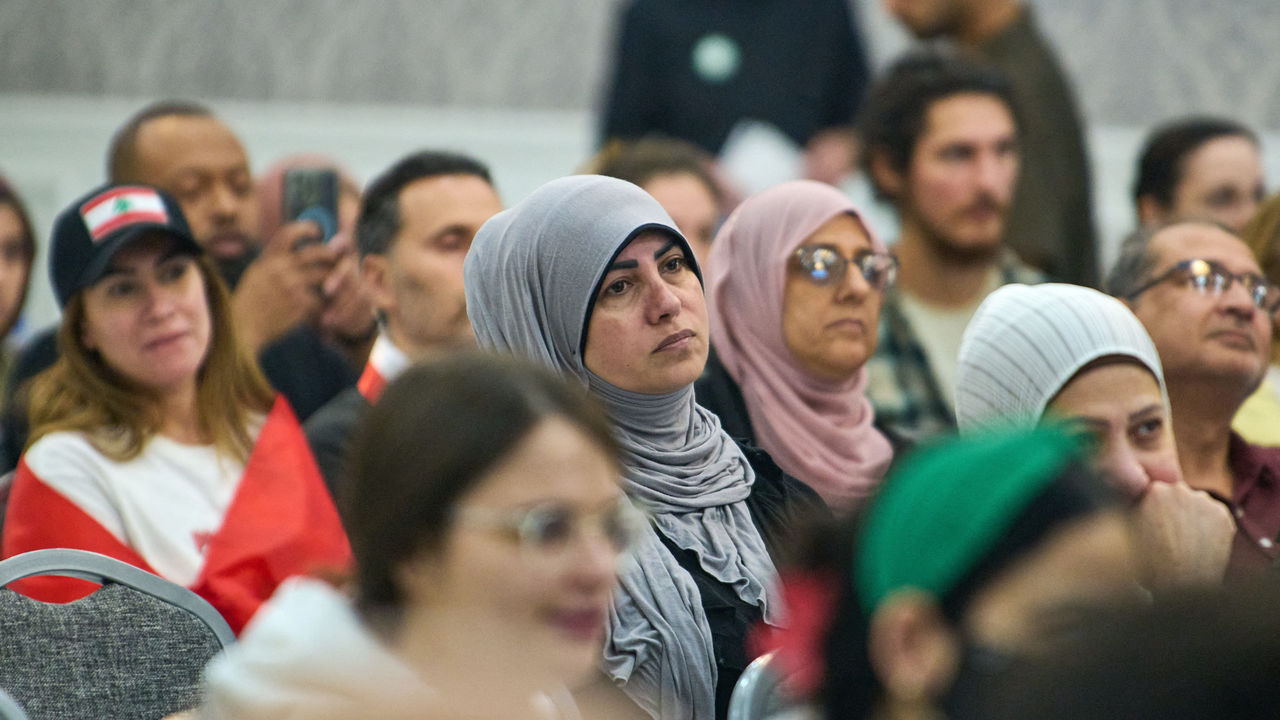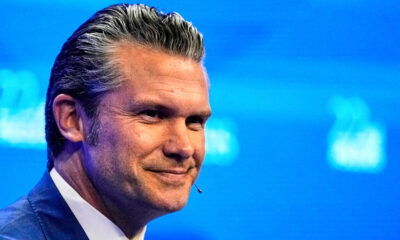AS PRESS conferences go, the one held at the Arab American Chamber of Commerce building in Dearborn, a suburb of Detroit, on October 27th, was uncomfortable. On one side of a boardroom table, opposite a crowd of cameras and microphones, sat around a dozen men and women who are influential in Arab-American circles. Taking turns to speak, each of them explained how they were directly affected by war in the Middle East; how they felt disappointed and betrayed by President Joe Biden; and how despite it all, they would still be voting for Kamala Harris.
“I’ve heard people in my community say they want to punish Democrats for this war,” said James Zogby, the second speaker and the founder of the Arab American Institute. “They’re not going to punish Democrats. They’re going to punish immigrants. They’re going to punish innocent people.” He finished with a plea: “Don’t punish the country, the world, your children, your grandchildren, because you’re angry.”
As they spoke, a small crowd holding up Palestinian flags was gathering outside, suggesting that they would be doing exactly that: “There are traitors inside,” went the chant. “Endorsing our genocide.” Later they called the attendees “Zionist collaborators”. According to Jenin Yaseen, one of the protesters, the only difference between Ms Harris and Donald Trump is the speed at which each would accept the murder of all Palestinians. Both are appalling, she said, but she thought Mr Trump was at least honest in his contempt for the Palestinian cause.
Michigan is among the closest of swing states, with polls suggesting Ms Harris has the slenderest of leads: our model puts her just 0.4 percentage points ahead. And according to the census bureau, 310,000 people claim Middle Eastern or North African origins in the state, or about 3% of the total. Winning over Arab voters could deliver Mr Trump the election. On October 26th, at a rally in Novi, a suburb of Detroit, the former president appeared on stage with 21 Muslim and Arab leaders (all men), after being endorsed by the mayors of Dearborn Heights, a heavily Arab suburb next to Dearborn proper, and of Hamtramck, an enclave of Detroit with a fully Muslim city council. Mr Trump, one imam declared, will deliver “peace”.
This seems rather implausible. According to Lindsay Graham, a Republican senator, Mr Trump recently told Binyamin Netanyahu, the prime minister of Israel, that he has “awe” for Israeli military operations and backs more of them. The former president has also called for Mr Netanyahu to “finish the job”. But that may not stop some Arab-Americans in Michigan from voting for him.
Rania Batrice, a Palestinian-American Democratic operative who worked for Bernie Sanders in 2016, and who is reluctantly backing Ms Harris, says that those supporting Mr Trump know his promises of peace are “a big fat lie”. But she worries they don’t care, because they are simply too angry with Mr Biden and Ms Harris. Many were initially warmer towards her, but are disappointed the vice-president has not broken rhetorically with Mr Biden since becoming the nominee.
There is some reason to think that a few Muslims would be drifting to Mr Trump even without the war, and that the bloodshed in Gaza and Lebanon simply provides an excuse. On a call organised by the Trump campaign on October 21st, Amer Ghalib, the mayor of Hamtramck, barely mentioned the war in Gaza at all. An imam present suggested that if Ms Harris wins, “the boys will turn to girls, and the girls will turn to a boy.” Melissa Gilchrist, a resident of Hamtramck, says that she thinks Mr Ghalib’s endorsement of Mr Trump is more about local politics. A year ago, she was at the front of a protest against Mr Ghalib after he removed the city’s gay-rights rainbow flag from outside City Hall. The mayor and his clique “are much more conservative on social things than the Democratic Party”, she says. Endorsing Mr Trump is a jab at his critics locally.
A poll conducted for the Arab American Institute earlier this month found Arab-Americans divided equally between the two candidates. Muslim and Arab voters may also just stay away from the polls, or else turn out for a third-party candidate. A campaign encouraging them to do just that, called “Abandon Harris”, has endorsed Jill Stein, the Green Party candidate. Hassan Abdel Salam, its founder, says that his hope is that Ms Harris loses the election by a narrow margin in Michigan, and then that Democrats react by insisting their next candidate should adopt a more forceful approach to Israel. “We want to be written in history, for our great great grandchildren, we want to be remembered forever,” he says. It is a thought. ■

 Economics1 week ago
Economics1 week ago
 Blog Post6 days ago
Blog Post6 days ago
 Accounting1 week ago
Accounting1 week ago
 Economics1 week ago
Economics1 week ago
 Personal Finance1 week ago
Personal Finance1 week ago
 Economics1 week ago
Economics1 week ago
 Personal Finance1 week ago
Personal Finance1 week ago
 Accounting1 week ago
Accounting1 week ago


















